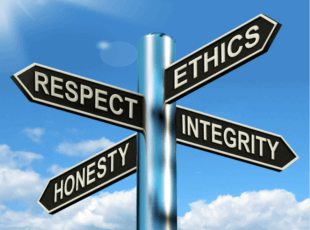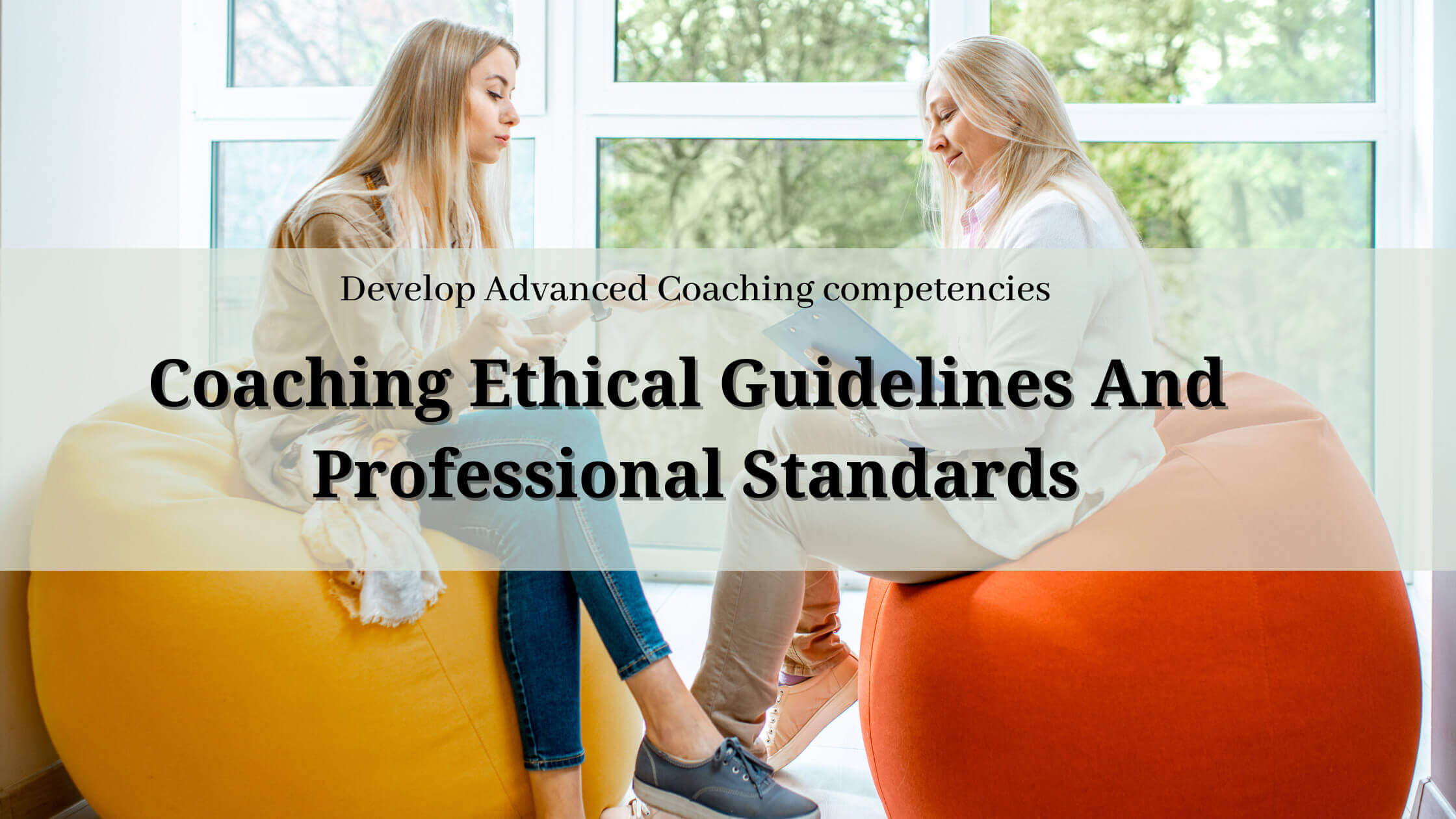Ethical dilemmas can undermine the integrity of coaching and therapeutic relationships, risking client trust and professional credibility. Many coaches and therapists struggle to navigate the complexities of ethical practice, leading to potential legal and moral pitfalls.
These issues can damage reputations, harm clients, and result in severe professional consequences. The lack of clear ethical guidance can leave practitioners feeling vulnerable and unsure of their actions.
By deeply understanding and internalizing ethical guidelines and professional standards, coaches and therapists can safeguard their practices and build a foundation of trust and respect with clients. Continuous learning, self-reflection, and adherence to these principles ensure that professionals act with integrity, responsibility, and cultural sensitivity, ultimately fostering successful and ethical client outcomes.
Understanding ‘Meeting Ethical Guidelines and Professional Standards’
This competency involves more than mere compliance with a set of rules. It requires a deep understanding and internalization of ethical principles and best practices identified through research and experience. This competency ensures that coaches and therapists act with responsibility, dignity, and honour, reflecting the moral imperative of their profession.
Core Principles:
- Confidentiality: Protecting client information and maintaining privacy.
- Informed Consent: Ensuring clients understand the scope, risks, and benefits of the coaching or therapeutic process.
- Avoidance of Conflicts of Interest: Recognizing and managing potential conflicts to maintain objectivity.
- Boundaries: Understanding the limits between coaching and therapy and navigating them with discretion and awareness.
- Cultural Sensitivity: Acknowledging and respecting cultural diversity, equity, and inclusion.
An important distinction is that coaches should not work with clients experiencing intense negative emotions, trauma, or mental and emotional disorders, as these areas require specialized training that therapists (psychologists) possess. This demarcation ensures that clients receive appropriate care and support.
These principles serve to uphold the integrity of the profession, guiding ethical reflection, education, and decision-making.
Developing the core competency of ‘Meeting Ethical Guidelines and Professional Standards’
To develop this competency, coaches and therapists must engage in a continuous process of learning, reflection, and application. Here’s a step-by-step guide to cultivating this critical skill:
Step-by-Step Guide:
- In-depth Learning:
- Familiarize yourself with the professional standards and ethical guidelines relevant to your practice.
- Understand the rationale behind each principle to internalize their importance.
- Practice Self-Reflection:
- Regularly reflect on your practice to ensure you operate within ethical boundaries.
- Maintain a reflective journal to record and contemplate ethical dilemmas and your responses to them.
- Develop Processes for Common Issues:
- Outline clear procedures for obtaining informed consent, maintaining confidentiality, managing conflicts of interest, and handling dual relationships.
- Ensure these processes are transparent and understood by clients.
- Continuing Education:
- Commit to ongoing learning opportunities focusing on ethics in coaching and therapy.
- Stay updated on current discussions and ethical considerations within the professional community.
- Seek Supervision and Peer Consultation:
- Use supervision and peer consultations to explore complex ethical issues.
- Discuss concerns and gain different perspectives.
- Create Ethical Decision-Making Processes:
- Develop and implement clear ethical decision-making processes within your practice.
- Establish transparent procedures for confidentiality, informed consent, and navigating dual relationships.
- Discuss and Deliberate:
- Engage in professional discussions with peers to deliberate over ethical dilemmas and scenarios.
- Collective reasoning can offer new insights and strengthen your ethical resolve.
- Apply Feedback Systems:
- Utilize client feedback mechanisms to assess the efficacy of your ethical practices.
- Honest feedback ensures your ethical guidelines align with clients’ needs and perceptions.
- Institute Regular Check-ins:
- Schedule periodic check-ins with yourself or a mentor to review your ethical practice.
- Regular assessment helps maintain high standards and provides opportunities for course adjustments.
Application in Coaching or Therapy Practice
Applying ethical guidelines and professional standards in practice demonstrates a commitment to high standards and enhances the coaching and therapy experience for clients. Here’s how to integrate these principles into your sessions:

Key Practices:
- Setting Boundaries:
- Clearly communicate boundaries and ethical standards at the start of a coaching relationship.
- Use consent forms and agreements to establish these guidelines.
- Empowered Decision Making:
- Equip clients to make informed decisions by providing necessary information upfront.
- Clarify roles, expectations, and the scope of services.
- Embrace Diversity and Inclusivity:
- Adapt coaching methods to respect cultural and individual differences.
- Practice cultural humility and seek to understand clients’ diverse backgrounds.
- Dealing with Ethical Complexity:
- Use ethical principles as your guide when facing complex situations.
- Document your decision-making process and seek confidential supervision if necessary.
- Privacy and Confidentiality:
- Ensure client confidentiality in all aspects of your practice.
- Know the limits of confidentiality in legal situations.
- Tailoring the Approach:
- Recognize when a client’s needs go beyond coaching and refer them to appropriate resources or professionals.
- Continuous Ethical Education:
- Regularly discuss ethical scenarios and stay updated with educational tools to keep ethical considerations at the forefront.
Incorporate these practices thoughtfully into your sessions to build a strong foundation of trust and efficacy, creating a safe space where clients can openly share and grow.
Cognitive Hypnotic Coaching Advantage
The Cognitive Hypnotic Coaching Diploma provides a unique platform for integrating ethical considerations into a coach’s professional repertoire. This program offers distinctive strategies that shape practitioners to meet and exceed ethical guidelines.
Key Benefits:
- Ethical Framework Integration:
- The program emphasizes the importance of ethics throughout its curriculum.
- Ethical standards are a fundamental component of effective coaching.
- Technique Alignment:
- Cognitive Hypnotic Coaching provides methodologies and tools that align with high ethical standards.
- Success Stories:
- Graduates share experiences on how rigorous training in ethics has shaped their coaching philosophy.
- Real-world Application:
- Training includes ethical scenario simulations and discussions, allowing participants to navigate challenging situations.
- Mentorship Support:
- Mentorship from experienced practitioners offers a safety net for dealing with ethical dilemmas.
This combination of structured training, applied ethics, and community support prepares diploma participants to operate with integrity and confidence.
Overcoming Challenges and Pitfalls
While striving to maintain ethical guidelines, coaches encounter various challenges. Here’s how to address and overcome some common ones:
Common Challenges and Solutions:
- Boundary Issues:
- Clearly outline the scope of the coaching relationship and regularly revisit boundaries.
- Multiple Relationships:
- Avoid relationships that could impair work or harm the client. Prioritize the professional relationship’s integrity.
- Keeping Up with Changes:
- Commit to ongoing education to stay updated on new guidelines.
- Managing Transference and Countertransference:
- Supervision and personal development work are key to managing these dynamics.
- Confidentiality in the Digital Age:
- Use secure channels for communication and store client information carefully.
When facing an ethical dilemma, refer back to foundational principles, seek supervision, or consult peers. Addressing these challenges is crucial for personal growth and professional development.

Ethical Considerations
Ethics form the bedrock of the coaching profession. As coaches, it is imperative to consider the ethical implications of our work to maintain the fidelity of the coach-client relationship.
Critical Ethical Considerations:
- Client Welfare: Ensure that your services benefit the client and do not cause harm.
- Professional Conduct: Uphold a professional demeanor and follow through on commitments.
- Competence Boundaries: Recognize your expertise limitations and refrain from providing services outside your scope.
- Cultural Sensitivity: Embrace diversity and strive to understand clients’ cultural contexts.
- Confidentiality: Safeguard all client information and clearly communicate the parameters of confidentiality.
- Dual Relationships: Avoid relationships that could exploit the client or harm the professional relationship.
- Public Statements and Responsibility: Obtain consent before making public statements involving clients.
- Transparency and Consent: Inform clients about session details and obtain consent.
- Client’s Right to Terminate: Respect clients’ right to terminate the coaching relationship.
Additionally, coaches should not work with clients experiencing intense negative emotions, trauma, or mental and emotional disorders. These areas require specialized training that therapists (psychologists) possess, ensuring clients receive appropriate care and support.
By consistently applying these ethical principles, coaches protect their clients and enhance the quality and effectiveness of the coaching relationship.
Conclusion
Mastering the coaching competency of Meeting Ethical Guidelines and Professional Standards is an ongoing journey marked by continuous learning, self-assessment, and unwavering commitment to client welfare. Upholding these standards ensures the creation of a safe and trusting environment where true transformation is possible.
Call to Action:
Reflect on the ethical principles that resonate most with you. Consider how to integrate them further into your practice and what steps to take for continued growth.
Let this be an invitation to delve deeper, explore further, and engage in discussions about ethics in coaching. The path to ethical mastery is rich with learning—and it is a path well worth traveling.
These guidelines and professional standards serve to uphold the integrity of ICHARS and the coaching profession by:
- Setting standards of conduct consistent with core values and ethical principles.
- Guiding ethical reflection, education, and decision-making.
- Providing the basis for ethics training in their widely recognized programs.
Remember as a coach, it is important to focus on developing advanced coaching competencies and for psychologists, it is equally important to develop advanced therapeutic skills.

